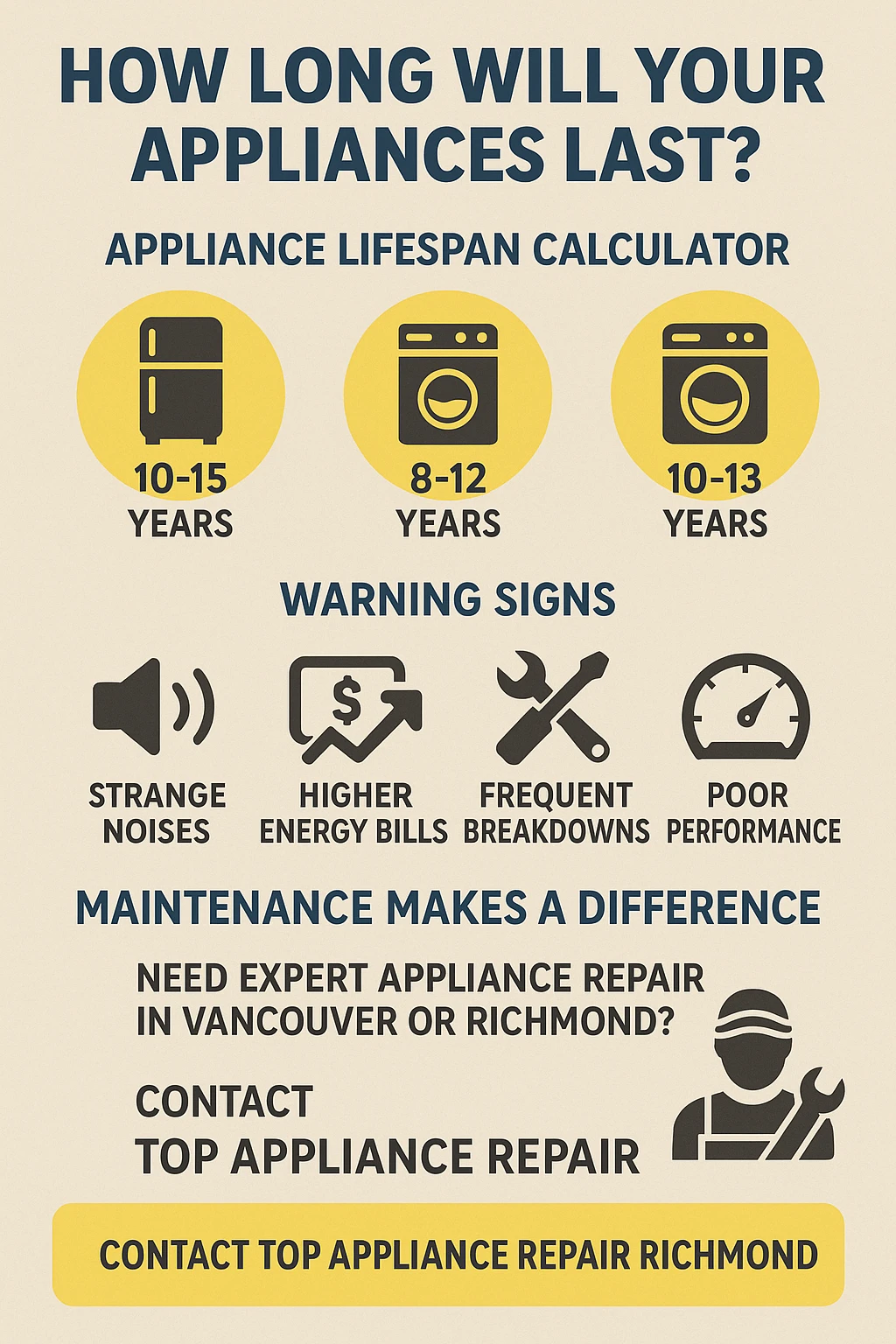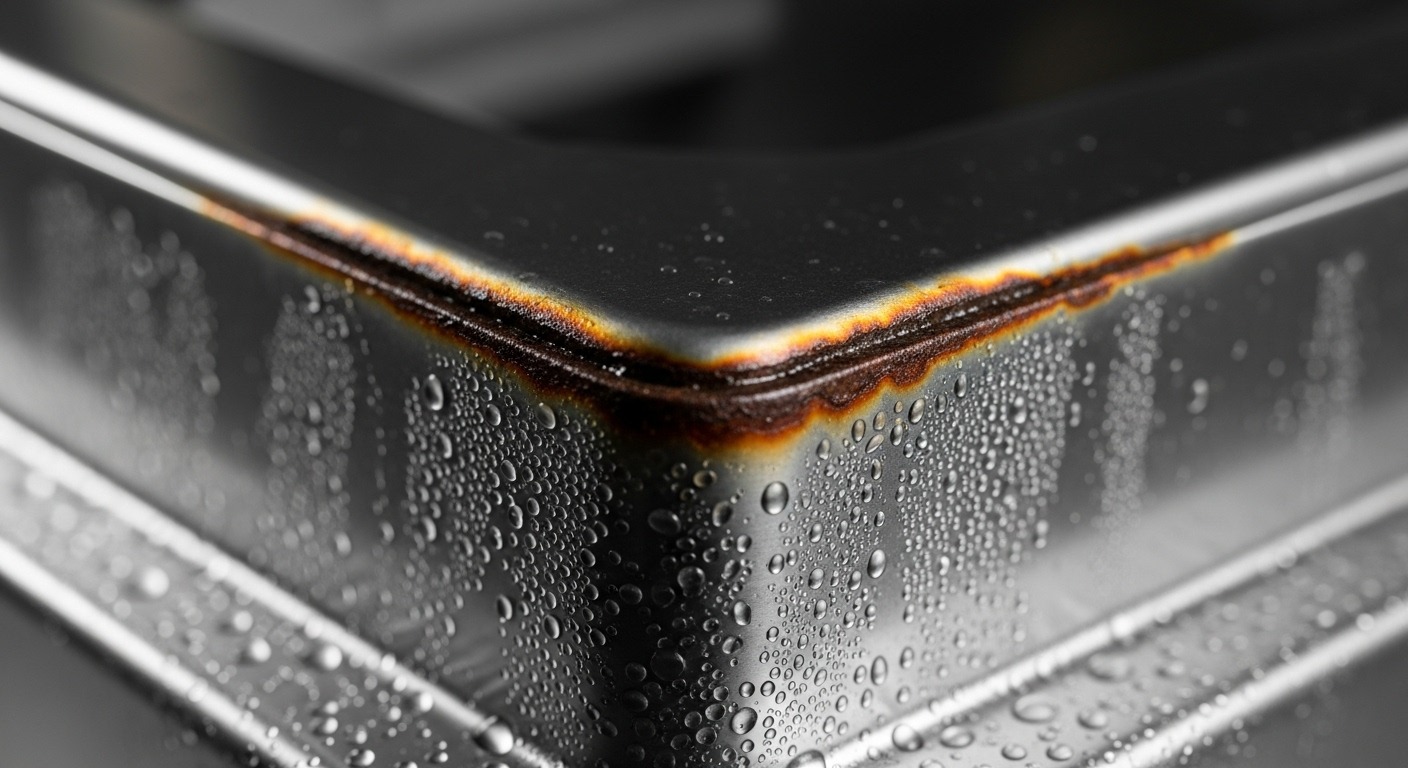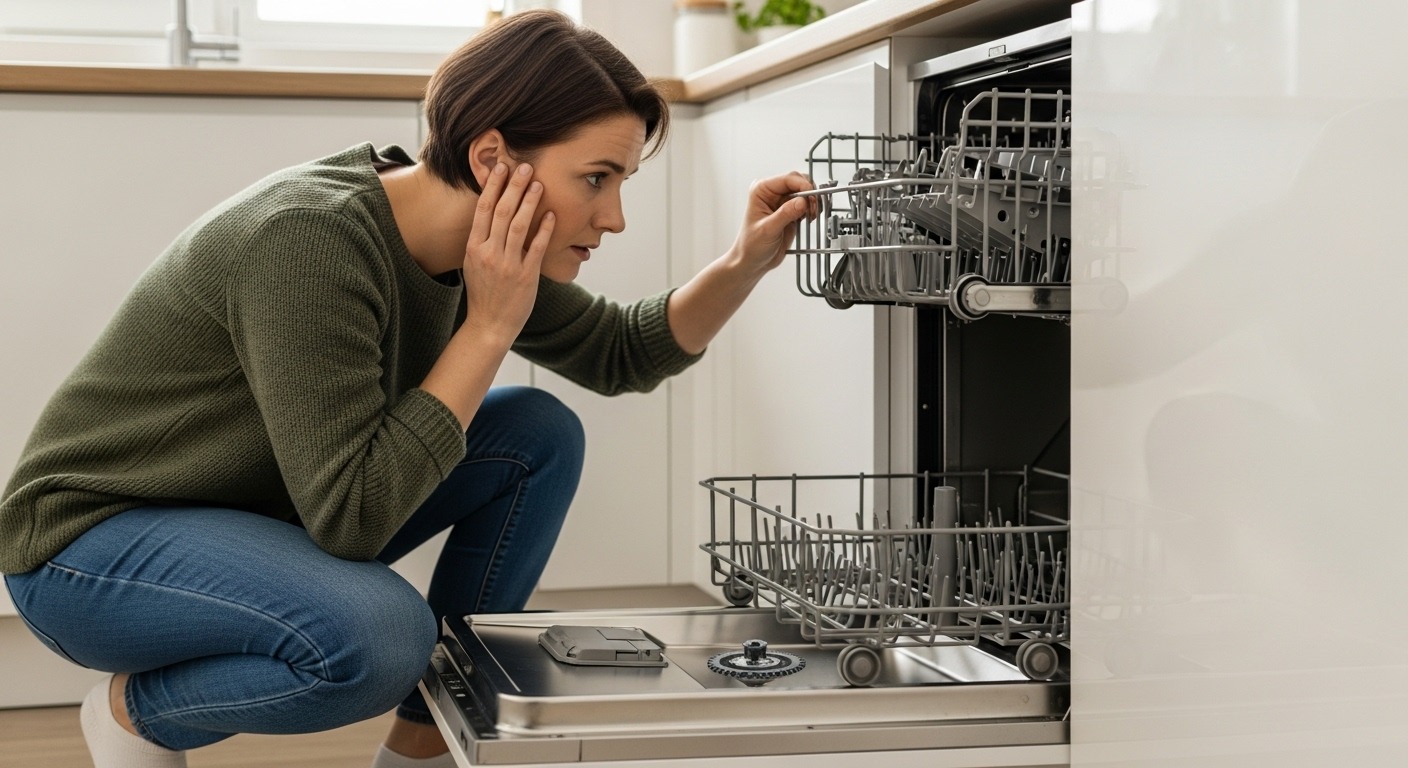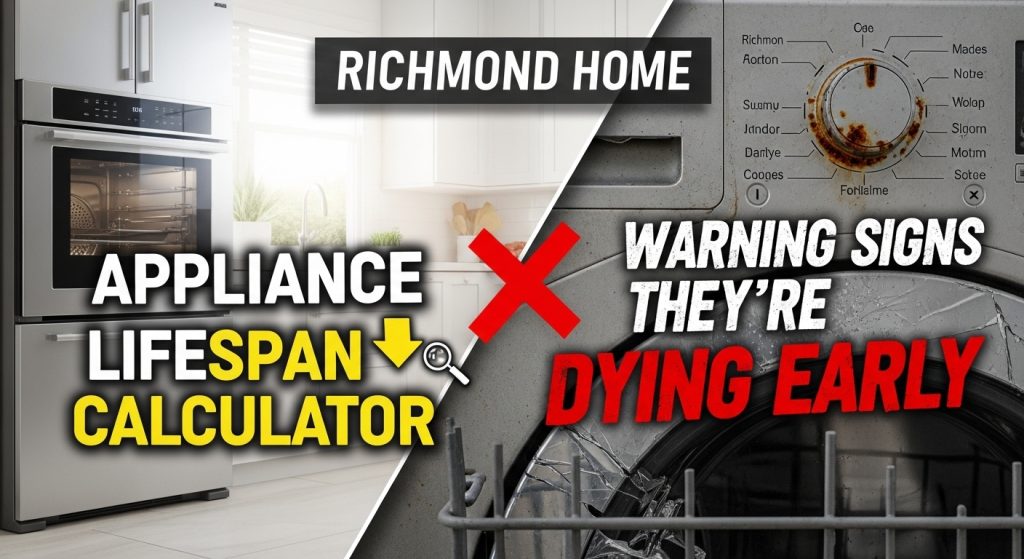Appliance Lifespan Calculator: How Long Should Your Richmond Home Appliances Actually Last (And Warning Signs They’re Dying Early)
Ever wondered if that weird noise from your dishwasher means it’s time to start appliance shopping, or if you can squeeze another year out of your 12-year-old fridge? We’ll break down exactly how long your Richmond home appliances should last, the sneaky warning signs they’re giving up the ghost early, and how our coastal climate might be sabotaging your kitchen investments.Picture this: you’re hosting your first dinner party since moving to Richmond, and halfway through prep, your dishwasher starts making sounds like it’s auditioning for a horror movie soundtrack. Sound familiar? If you’re like most Richmond homeowners, you’ve probably found yourself playing appliance roulette – wondering whether that aging fridge will make it through another summer or if your washing machine’s latest quirk is actually a cry for help. Living in Richmond means dealing with unique challenges that most appliance guides completely ignore. Our coastal location brings moisture, salt air, and weather patterns that can seriously mess with your appliances’ expected lifespans. That “typical 10-year dishwasher life” you read about online? Yeah, that might be more like 8 years when you factor in our humidity and the occasional atmospheric river that makes your laundry room feel like a sauna.Here’s the thing though – most appliance failures are totally preventable, and knowing what to look for can save you from those panic-inducing moments when your fridge decides to take a vacation during a heat wave. Plus, with appliance prices in the Lower Mainland being what they are (spoiler alert: not cheap), understanding when to repair versus replace becomes a crucial homeowner skill.
Key Outtakes:
- Richmond’s coastal climate can reduce typical appliance lifespans by 15-20% due to humidity and salt air exposure
- The 50% repair rule needs adjustment for Richmond’s higher appliance costs and delivery challenges
- Premium brands like Bosch and Miele often justify their higher costs with 2-4 additional years of service life
- Early warning signs like unusual noises and energy consumption spikes can help you avoid emergency replacements
- Climate-specific maintenance strategies can extend appliance life by 2-3 years beyond standard expectations

Understanding Standard Appliance Lifespans in Richmond’s Climate

Let’s get real about what you can actually expect from your appliances here in Richmond. Those national average lifespan charts you see online? They’re basically useless for us coastal folks dealing with humidity that makes your hair frizzy and your appliances cranky.Your refrigerator is probably the hardest working appliance in your home, and thankfully, it’s also one of the longest-lasting. Top-freezer models typically soldier on for 14-17 years, while those fancy French door models you’ve been eyeing usually last 12-18 years. Side-by-side units fall somewhere in the middle at 10-15 years. But here’s where Richmond throws a wrench in the works – our coastal humidity can knock 1-2 years off these expectations because moisture loves to mess with internal components and accelerate corrosion.Kitchen appliances follow pretty predictable patterns, though gas consistently beats electric when it comes to longevity. Gas ranges typically last 15-17 years compared to electric models at 13-15 years, mainly because they have fewer electronic components that can fail when exposed to cooking moisture and humidity. Your dishwasher should give you about 9-13 years of faithful service, though newer models with all their fancy electronic controls might tap out earlier due to moisture-related failures – something we see more of in Richmond’s humid environment.Laundry appliances show the wildest variation in lifespan, and honestly, it’s because we all treat them so differently. Washing machines can last anywhere from 5-15 years, with front-loaders often having shorter lifespans due to seal issues that get worse in our humid climate. Dryers typically make it 10-14 years, but in Richmond, they work harder because clothes take longer to dry in our moisture-heavy air, which can shave off a year or two. If you’re doing the average eight loads per week, you’re looking at the lower end of these ranges.The wild card in all this? How you use your appliances and how well you maintain them. A well-maintained appliance in a climate-controlled environment can easily exceed these expectations, while a neglected one in Richmond’s challenging conditions might not even hit the minimum. The key is understanding that our coastal location isn’t just about beautiful water views – it’s also about creating an environment that makes your appliances work overtime.
Climate-Specific Challenges for Richmond Appliances

Now that we’ve covered the basics, let’s talk about the elephant in the room – or should I say, the humidity in the air. Richmond’s coastal climate creates a perfect storm of conditions that can seriously impact how long your appliances last, and most homeowners don’t realize they’re fighting an uphill battle until it’s too late.Our notorious humidity levels are like kryptonite for appliances. That moisture in the air doesn’t just make your summer days feel stickier – it infiltrates your appliances and accelerates corrosion of metal components faster than you’d expect. This is especially brutal for appliances that experience temperature changes, like your fridge, dryer, and dishwasher. The constant expansion and contraction combined with moisture exposure creates the perfect recipe for premature component failure. I’ve seen washing machines develop mold issues and dryers with seal failures way ahead of schedule, all thanks to our loving coastal moisture.Salt air adds another layer of complexity that inland folks never have to worry about. Living near the Fraser River and Pacific Ocean means our air carries salt particles that settle on everything – including your appliances’ external components and ventilation systems. This salt exposure particularly hammers appliances with external venting systems, like your dryer and range hood. The combination of salt and moisture creates an incredibly aggressive corrosive environment that can cause your appliance exteriors to deteriorate and your venting systems to fail years earlier than they should.Then there’s our water situation. Richmond’s water supply, while generally good quality, tends to be on the harder side, especially in certain neighborhoods. Hard water is loaded with minerals that love to build up inside your water-using appliances like dishwashers, washing machines, and water heaters. This mineral accumulation doesn’t just reduce efficiency – it actively damages heating elements, clogs pumps, and wears out internal components. Many Richmond homeowners find themselves dealing with major appliance repairs 2-3 years earlier than expected simply because of scale buildup from hard water.Weather patterns unique to our region add yet another challenge. Those atmospheric rivers and sudden temperature swings we experience put extra stress on appliances as they work harder to maintain consistent performance. Your HVAC system, refrigerator, and dehumidifier all have to work overtime during our intense weather events, leading to accelerated wear on motors, compressors, and control systems. It’s like asking your car to perform equally well in the desert and the rainforest – without proper preparation and maintenance, something’s going to give way sooner than expected.
Recognizing Early Warning Signs Your Appliances Are Dying

The transition from normal operation to appliance failure rarely happens overnight, and learning to read the warning signs can save you from those dreaded emergency replacement situations. Your appliances are actually pretty good at telling you when they’re struggling – you just need to know their language.Unusual sounds are often the first red flag, and trust me, you’ll know when something’s off. Your refrigerator should hum quietly in the background, but if it’s suddenly working overtime with constant motor noise, excessive humming, or weird whistling sounds, your compressor might be struggling or your cooling system isn’t operating efficiently. Washing machines that start producing grinding noises, excessive vibration, or sounds like they’re trying to escape the laundry room are usually dealing with bearing failures or transmission issues that tend to deteriorate rapidly once they start. Dryers making grinding, squeaking, or squealing sounds often indicate drum bearing issues or heating element problems that can actually create fire hazards if you ignore them.Performance issues are equally telling and often easier for homeowners to notice during daily use. Your fridge should maintain consistent temperatures without breaking a sweat, but if food is spoiling before expiration dates, you’re seeing excessive condensation, or there are major temperature fluctuations, your cooling system is probably failing. Dishwashers that leave dishes still dirty or soaking wet after a cycle are often dealing with pump or heating element issues. For your laundry, clothes coming out of the washer still soapy or clothes from the dryer taking multiple cycles to dry are clear signs of trouble.Finally, your energy bill is the silent witness to your appliances’ health. A sudden, unexplained spike in your electricity or gas bill often points to an appliance that’s working way too hard to do its job. Your refrigerator’s compressor might be running constantly, or your dryer’s heating element could be failing, forcing it to run longer. Comparing your monthly bills is a surprisingly effective way to catch a failing appliance before it quits on you completely.
The Richmond Repair vs. Replace Dilemma: Adjusting the 50% Rule
 You’ve probably heard of the 50% rule: if a repair costs more than half the price of a new appliance, you should replace it. While that’s a decent starting point, it doesn’t quite work for us here in Richmond. We have to factor in the “Richmond Premium” – the higher costs for appliances, delivery, and installation that we face in the Lower Mainland.I recommend a modified 40% rule for Richmond homeowners. With new appliance prices being 10-15% higher here than in other parts of the country, a repair that might seem uneconomical elsewhere can actually be the smarter financial move for us. Before you even think about shopping, consider the appliance’s age. If it’s less than halfway through its expected lifespan (using our Richmond-adjusted numbers), a repair is almost always the better option. For example, spending $400 to repair a 5-year-old dishwasher that cost $1,000 new is a much better deal than spending $1,200 plus delivery and installation on a replacement.Also, think about brand quality. A high-end brand like a Miele or Bosch that’s 8 years old might still have another 5-7 years of life left in it, making a significant repair worthwhile. Conversely, a budget-friendly brand that’s already past its 5-year expected lifespan might not be worth a major investment, even if the repair is under the 40% threshold. The goal is to maximize the value you’ve already invested in your appliances, not just jump to a replacement at the first sign of trouble.
You’ve probably heard of the 50% rule: if a repair costs more than half the price of a new appliance, you should replace it. While that’s a decent starting point, it doesn’t quite work for us here in Richmond. We have to factor in the “Richmond Premium” – the higher costs for appliances, delivery, and installation that we face in the Lower Mainland.I recommend a modified 40% rule for Richmond homeowners. With new appliance prices being 10-15% higher here than in other parts of the country, a repair that might seem uneconomical elsewhere can actually be the smarter financial move for us. Before you even think about shopping, consider the appliance’s age. If it’s less than halfway through its expected lifespan (using our Richmond-adjusted numbers), a repair is almost always the better option. For example, spending $400 to repair a 5-year-old dishwasher that cost $1,000 new is a much better deal than spending $1,200 plus delivery and installation on a replacement.Also, think about brand quality. A high-end brand like a Miele or Bosch that’s 8 years old might still have another 5-7 years of life left in it, making a significant repair worthwhile. Conversely, a budget-friendly brand that’s already past its 5-year expected lifespan might not be worth a major investment, even if the repair is under the 40% threshold. The goal is to maximize the value you’ve already invested in your appliances, not just jump to a replacement at the first sign of trouble.
